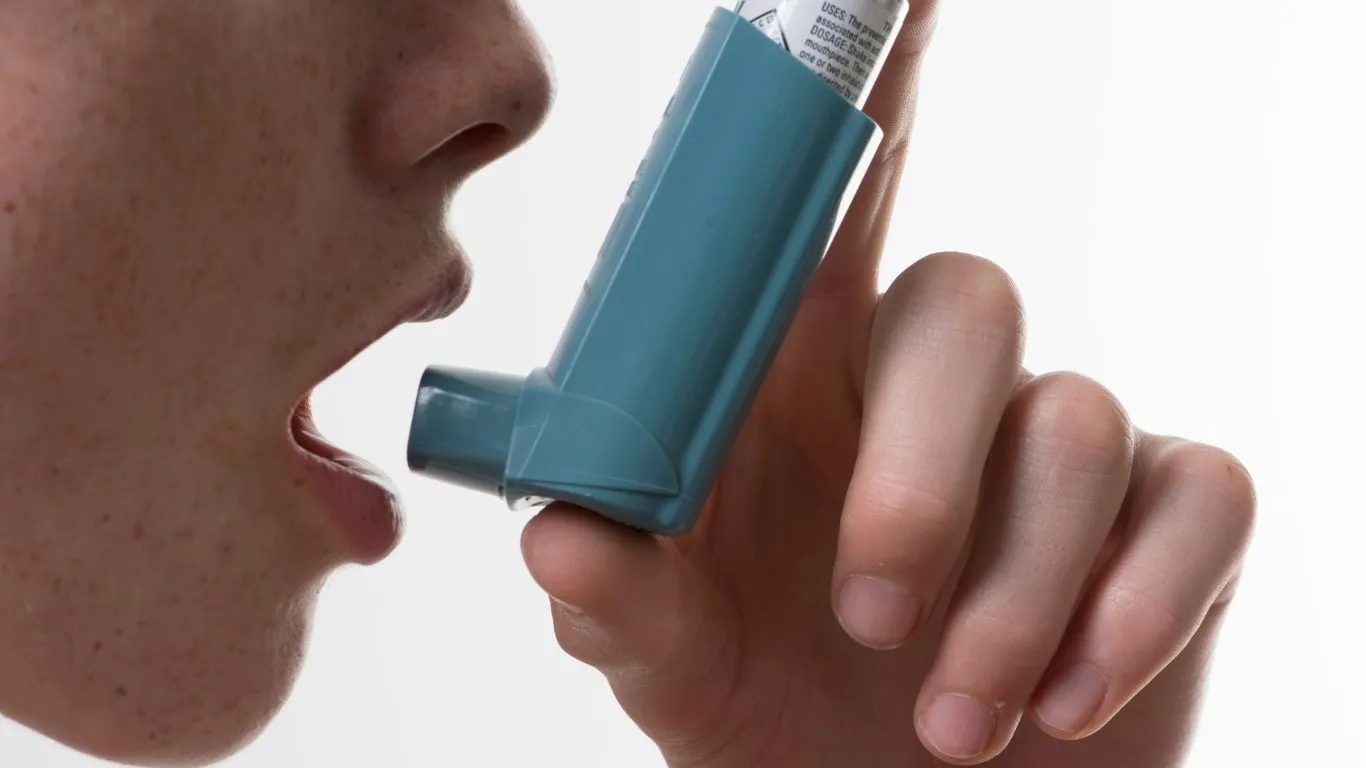Best Foods to Eat Before Exercising with Asthma for Energy and Better Breathing
As someone with years of experience as a pulmonary nurse, I’ve seen firsthand how crucial it is to manage asthma effectively, especially when it comes to physical activity. If you have asthma, you know that exercise can sometimes feel like a daunting task. Breathing becomes more labored, and there’s always that fear of triggering an attack. But here’s the thing: you can still enjoy a fulfilling, active lifestyle. The key is to prepare properly—and that includes making smart choices about the foods you eat before you exercise. In this article, we’re going to talk about the best foods to eat before exercising with asthma, helping you fuel up while protecting your lungs.
Understanding the Connection Between Asthma and Exercise

Before diving into the best foods to eat before exercising with asthma, it’s important to understand how exercise and asthma are connected. For many asthma sufferers, physical activity can trigger asthma symptoms like shortness of breath, wheezing, and chest tightness. This phenomenon is known as exercise-induced bronchoconstriction (EIB), and it can make exercising seem intimidating. However, with the right preparation, you can minimize these symptoms and enjoy a great workout. Your diet plays a big role in this, as certain foods can either trigger or ease asthma symptoms.
How Foods Impact Asthma Symptoms
When managing asthma, your diet can make a significant difference in how your body responds to exercise. Foods rich in antioxidants, for example, can help reduce inflammation in the airways, making it easier to breathe while you work out. On the other hand, foods that cause inflammation or trigger allergic reactions can worsen asthma symptoms, making your workout more challenging. So, what should you focus on eating before hitting the gym, the track, or even the yoga mat?
The Best Foods to Eat Before Exercising with Asthma

Let’s talk about the best foods to eat before exercising with asthma. While everyone’s triggers and preferences are different, these foods are generally safe for most people with asthma and can support better performance during physical activity.
1. Foods Rich in Omega-3 Fatty Acids
One of the top recommendations I always make to my patients is incorporating more omega-3 fatty acids into their diet. These healthy fats are known for their anti-inflammatory properties, which can help soothe the airways and reduce asthma symptoms. Omega-3s can be found in fatty fish like salmon, sardines, and mackerel. If you’re not a fan of fish, you can also get omega-3s from plant-based sources like chia seeds, flaxseeds, and walnuts.
2. Whole Grains for Sustained Energy
Whole grains like brown rice, quinoa, oats, and whole wheat bread provide a steady source of energy, which is crucial when you’re planning to work out. These foods are rich in fiber and complex carbohydrates, which are digested more slowly and provide long-lasting energy during exercise. If you suffer from asthma, it’s especially important to keep your energy levels up to avoid fatigue and stress during physical activity. Plus, the fiber in whole grains can help reduce inflammation in the body, which may have a positive effect on your asthma symptoms.
3. Bananas for Potassium and Smooth Breathing
Bananas are one of my go-to recommendations for my asthma patients. They’re packed with potassium, which helps regulate fluid balance in the body and can prevent cramping during exercise. More importantly, they contain magnesium, a mineral that helps relax the muscles of your airways, making it easier to breathe. Bananas are easy to digest, making them a great pre-workout snack.
4. Fresh Vegetables and Fruits High in Vitamin C
Vitamin C is a powerful antioxidant that can help reduce inflammation in the lungs and boost your immune system. Fresh fruits like oranges, strawberries, kiwi, and mangoes, as well as vegetables like bell peppers and broccoli, are packed with this essential nutrient. Eating these foods before exercise can give your lungs a bit of extra support when it comes to fighting off inflammation and boosting lung function during physical activity.
5. Ginger: A Natural Anti-Inflammatory
Ginger is another fantastic food to consider adding to your pre-workout meals. Known for its natural anti-inflammatory properties, ginger can help reduce swelling in the airways and make breathing easier. You can add it to smoothies, teas, or even mix it into a yogurt-based dip. The best part? It has a zesty, refreshing taste that pairs well with many other asthma-friendly foods.
Foods to Avoid Before Exercising with Asthma

While it’s important to know what to eat, it’s equally important to be aware of which foods might trigger asthma symptoms before exercising. For example, processed foods with artificial additives, preservatives, and food coloring can sometimes lead to allergic reactions or increased inflammation. Additionally, some people with asthma find that dairy products can exacerbate mucus production, which can make breathing more difficult during physical activity.
Other foods to avoid include:
- Highly processed meats like hot dogs and sausages
- Fried and greasy foods that can cause inflammation
- Caffeinated drinks in large amounts, as they may increase heart rate and potentially trigger asthma symptoms in some individuals
- Foods high in sodium, which can contribute to dehydration and worsen asthma symptoms
By avoiding these foods and focusing on the asthma-friendly options mentioned earlier, you’ll be giving yourself the best possible chance to have a successful and safe workout.
In the next section, we’ll dive deeper into how you can customize your pre-exercise meals based on your workout type and intensity. Stay tuned!
How to Tailor Your Pre-Exercise Meal Based on Workout Type

Now that you know what foods to focus on before your workout, it’s time to consider the type of exercise you’re planning. Different types of physical activities can demand different fuel, and knowing how to adjust your meals accordingly can make a big difference in how you feel during and after exercise. As someone who has worked closely with asthma patients, I’ve seen that having the right pre-exercise meal can help manage asthma symptoms, providing the energy and nutrients your body needs without overwhelming your lungs.
1. Low-Intensity Exercise: Opt for Easy-to-Digest Carbs and Protein
If you’re planning a low-intensity workout, like a light walk, yoga session, or leisurely cycling, you don’t need to load up on heavy carbs or fats. Instead, a small meal or snack that’s easy to digest, rich in complex carbs and moderate protein, can help fuel your workout without causing any digestive issues or exacerbating asthma symptoms.
For a low-intensity session, try:
- A banana with a spoonful of almond butter
- A slice of whole-grain toast with a boiled egg
- A small smoothie with spinach, oats, and a handful of berries
These meals provide enough energy to support your workout without being too heavy on your system, which can be particularly helpful for those of us managing asthma.
2. Moderate-Intensity Exercise: Focus on Balanced Meals for Energy
If you’re planning to engage in moderate-intensity exercises like jogging, strength training, or a more intense cycling session, you’ll want a meal that combines healthy carbohydrates, lean proteins, and a bit of healthy fat. This combination will give you the energy needed for sustained physical activity, while also ensuring your lungs stay as comfortable as possible during your workout.
For a moderate-intensity workout, consider the following pre-workout meal options:
- Grilled chicken with quinoa and steamed veggies
- A small bowl of oatmeal topped with chia seeds and blueberries
- Whole-wheat pita with hummus and cucumber slices
These meals provide a steady release of energy, helping you avoid that mid-workout fatigue. Plus, they’re packed with anti-inflammatory ingredients like quinoa and chia seeds, which can assist in reducing asthma symptoms.
3. High-Intensity Exercise: Carb Loading and Protein Recovery
If you’re gearing up for a high-intensity workout—whether it’s running sprints, doing HIIT (High-Intensity Interval Training), or lifting heavy weights—your body requires more fuel. High-intensity exercise can drain your energy reserves quickly, and having the right pre-exercise meal can ensure you have enough energy to perform at your best. However, it’s equally important to not overload your digestive system with too much fat or fiber before these types of exercises, as that can cause discomfort.
For high-intensity workouts, I recommend focusing on easily digestible carbs with moderate protein and a small amount of healthy fat. Here are some excellent pre-workout options:
- A smoothie with banana, protein powder, and a splash of almond milk
- A whole-grain bagel with peanut butter and a side of fruit
- A rice cake with turkey slices and avocado
The key here is to give your body quick-access energy from the carbs, while protein will help support muscle repair and recovery. The fat is necessary but should be kept to a minimum, as too much fat can slow digestion during high-intensity activities.
Hydration: The Often-Overlooked Factor for Asthma Management

When you have asthma, staying hydrated is just as important as eating the right foods before exercise. Dehydration can lead to thickening of the mucus in your airways, which can make it harder to breathe and trigger asthma symptoms during physical activity. As a nurse, I often emphasize the importance of drinking water throughout the day, but especially before and during exercise. Water helps to thin mucus and keeps your airways open, allowing you to breathe more easily during your workout.
In addition to plain water, herbal teas or water infused with a slice of lemon or cucumber can be a refreshing way to stay hydrated. Just avoid drinks with high caffeine content or sugary sports drinks, as these can sometimes trigger asthma symptoms or cause dehydration.
When Should You Eat Before Exercising with Asthma?
Timing your meals properly before exercise is crucial for maintaining energy levels while preventing asthma flare-ups. As a general rule of thumb, you should aim to eat your pre-workout meal about 30 minutes to 2 hours before exercising. This gives your body enough time to digest the food and convert it into usable energy, while also preventing any discomfort that might arise from exercising on a full stomach.
Everyone’s digestion is different, so pay attention to how your body responds. If you’re someone who tends to experience digestive discomfort when eating closer to exercise time, try eating a smaller snack 30 minutes before working out. On the other hand, if you need more time to digest, try eating a larger meal 1.5 to 2 hours before you start exercising.
Personal Experience: Finding What Works for You
From my experience as a pulmonary nurse, I’ve found that managing asthma while exercising is all about trial and error. Everyone is different, and what works for one person may not work for another. That’s why it’s important to listen to your body and adjust your pre-exercise meals based on how you feel. Keep track of how your asthma symptoms behave with different foods and meal timings, and don’t hesitate to consult with your healthcare provider if you’re unsure.
Some people may find that they do best with a larger pre-workout meal, while others prefer something lighter. Some may need to experiment with avoiding certain foods (like dairy or gluten) to see if that makes a difference in their asthma control during exercise. The key is to be flexible and patient as you figure out what works best for you.
What About Supplements for Asthma and Exercise?

While I always recommend focusing on whole foods for asthma management, some people may benefit from certain supplements that can support their workouts and overall asthma control. For example, magnesium supplements have been shown to help relax the muscles in the airways, potentially making it easier to breathe during exercise. Likewise, vitamin D is essential for lung health, and a deficiency in this vitamin has been linked to worsened asthma symptoms.
However, I always recommend discussing any new supplements with your doctor before adding them to your routine. Some supplements can interact with medications, so it’s important to make sure they’re safe for your individual needs.
How to Recover and Replenish After Exercise with Asthma

While we’ve focused a lot on what to eat before exercising with asthma, let’s not forget that recovery is just as important. After exercise, your body needs the right nutrients to help with muscle repair, reduce inflammation, and restore energy levels. This is especially true for those of us with asthma, as the body’s inflammatory response can be heightened post-workout. In this section, we’ll dive into some essential post-exercise foods that will help with recovery and improve your lung health in the process.
1. Protein for Muscle Recovery and Lung Health
One of the first things to think about after any workout is replenishing your muscles with protein. When you exercise, you break down muscle fibers, and your body needs protein to repair and build them back stronger. But protein isn’t just important for muscle recovery; it’s also essential for your immune system and overall health, which plays a huge role in asthma management.
Some excellent post-workout protein sources include:
- Grilled chicken or turkey breast
- Greek yogurt with a drizzle of honey
- Eggs or a protein shake
- Hummus and whole-grain crackers
I often suggest combining protein with a source of carbohydrates to help replenish the glycogen stores your muscles used during exercise. The combination of both helps your body recover more efficiently. For example, a smoothie made with protein powder, banana, and some almond milk is a great recovery option.
2. Anti-Inflammatory Foods to Ease Post-Exercise Inflammation
Inflammation is part of the body’s natural response to exercise, but for those with asthma, it’s important to manage this inflammation carefully. Some foods can help soothe the body’s post-workout inflammatory response, making them especially beneficial for asthma sufferers. Anti-inflammatory foods like berries, leafy greens, and fatty fish can help reduce inflammation in the airways and muscles.
Here are some great anti-inflammatory foods to incorporate into your post-workout meal:
- Salmon or mackerel (packed with omega-3 fatty acids)
- Spinach, kale, and other leafy greens
- Blueberries, strawberries, or cherries (loaded with antioxidants)
- Turmeric and ginger (natural anti-inflammatory spices)
These foods not only assist with reducing muscle soreness but also help keep your airways calm, which is a critical factor when you have asthma. I always tell my patients that the best thing they can do is to treat their bodies with care, even after the workout is over.
3. Hydration: Don’t Forget to Rehydrate
Rehydrating after exercise is another crucial aspect of post-workout recovery. Asthma sufferers often face additional respiratory strain during physical activity, which can lead to dehydration. When you’re dehydrated, your body produces thicker mucus in the airways, which makes it harder to breathe and can trigger asthma symptoms. To avoid this, make sure to drink plenty of water after exercise to help thin the mucus and restore your body’s fluid balance.
In addition to water, you might consider a sports drink that contains electrolytes to help replenish lost minerals, especially after more intense workouts. Just be sure to choose one with minimal sugar content, as excessive sugar can sometimes trigger asthma symptoms.
Common Mistakes Asthma Sufferers Make When Exercising

As someone with experience in pulmonary care, I’ve seen many asthma sufferers make the same mistakes when it comes to exercising. These missteps can lead to unnecessary discomfort or even exacerbate asthma symptoms. Let’s go over some of the common pitfalls and how you can avoid them.
1. Skipping Pre-Exercise Meals
One of the biggest mistakes is skipping your pre-exercise meal or snack. As I mentioned earlier, eating the right foods before exercise is essential for maintaining energy levels and reducing inflammation. Skipping this step can lead to fatigue, weakness, and difficulty breathing during your workout. Even a small snack like a banana or a handful of almonds can make a big difference in how you feel during exercise.
2. Overdoing It on High-Intensity Workouts
Another common mistake is jumping into high-intensity exercise too quickly. If you’re new to exercising or haven’t worked out in a while, it’s important to ease into it. Overdoing it can put unnecessary strain on your lungs and trigger asthma symptoms. Start with low to moderate-intensity exercises and gradually increase the intensity as your fitness level improves. This approach will help you build strength and endurance without overburdening your body.
3. Ignoring Breathing Techniques
Breathing techniques are crucial for asthma sufferers, especially during exercise. I’ve had patients who were so focused on their workout that they neglected their breathing, which made their asthma worse. Learning to breathe deeply and slowly through your nose can help manage asthma symptoms and improve performance. Consider incorporating breathing exercises into your warm-up and cool-down routine to train your lungs and optimize airflow during exercise.
Final Thoughts: Embrace Your Asthma-Friendly Exercise Routine
Having asthma doesn’t mean you can’t enjoy exercise or lead an active lifestyle. By eating the right foods before and after your workout, staying hydrated, and avoiding common mistakes, you can successfully manage asthma symptoms while staying fit and healthy. With a little preparation, you can optimize your workouts and feel great while doing them.
It’s also important to remember that everyone’s asthma is different, and it may take some time to figure out what works best for you. Don’t be afraid to experiment with different pre- and post-workout meals and monitor your asthma symptoms to find the perfect balance.
And remember, always listen to your body. If something feels off, or if you start feeling short of breath or wheezy during exercise, take a break, use your inhaler if prescribed, and give yourself time to recover.
For more information about asthma and exercise, you can visit trusted health websites like NIH or Health.com.
Disclaimer
The information provided in this article is for general informational purposes only and is not intended as medical advice. Always consult with your healthcare provider or a registered dietitian before making any significant changes to your diet, exercise routine, or asthma management plan. The author of this article is not responsible for any adverse effects that may occur from following the suggestions made herein.

Bianca Nala is a compassionate Nurse Practitioner with a strong background in primary and respiratory care. As a health writer for Healthusias.com, she combines her clinical expertise with a talent for clear, relatable storytelling to help readers better understand their health. Bianca focuses on topics like asthma, COPD, chronic cough, and overall lung health, aiming to simplify complex medical topics without losing accuracy. Whether she’s treating patients or writing articles, Bianca is driven by a single goal: making quality healthcare knowledge accessible to everyone.






